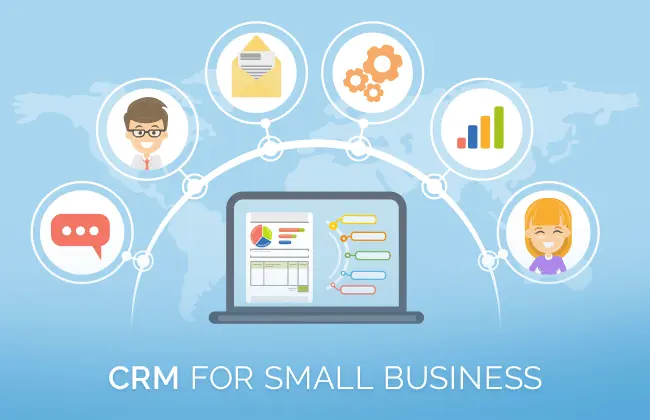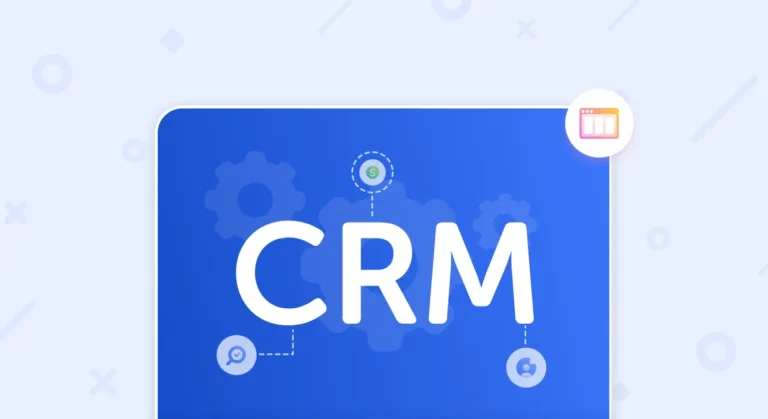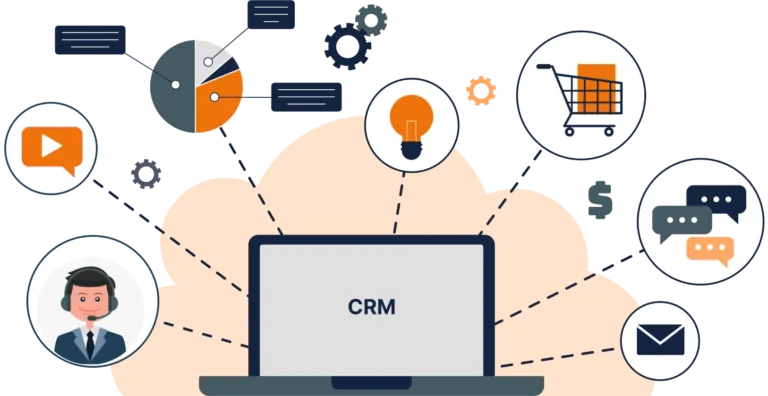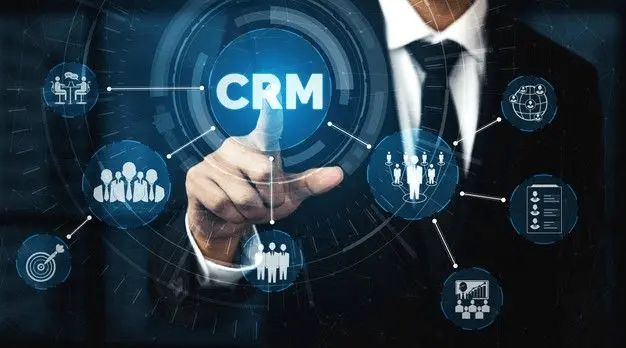The Ultimate CRM for Small Businesses Playbook: Tools, Tips & Future Trends
As you run a small business, you may feel like wearing 10 hats at once. Managing sales, tracking orders, and satisfying customers with the best experience all at once sometimes becomes harder than imagined. Handling everything at a time without big teams sounds difficult for small business owners. That’s where CRM for Small Businesses steps in. Let’s take it as a digital assistant designed specifically to lessen your burden by managing sales tracking and customer data.
If you’ve ever felt like being caught up too much in the management and tracking of customers and sales, this article is for you.
- What exactly is CRM for Small Business?
- Why Your Small Business may struggle without CRM?
- How can CRM help your small business thrive?
- Benefits of CRM in Real Life
- How to Choose the Right CRM for Small Businesses?
- Popular CRM options for 2025
- Industry Specific CRM Solution
- Step by step CRM implementations
- The future of CRM for small businesses
- FAQs About CRM Small Businesses
- Why invest in a Custom CRM?
- Conclusion
What exactly is CRM for Small Business?
CRM stands for Customer Relationship Management. Small businesses integrate CRM for storing data, client contact details, purchase history, transaction details, customer emails, and preferences, all in one place.
When you log into CRM, instead of going through the mess of spreadsheets, you can easily access to:
- Who your customers are
- What they have bought
- When was the last time they contacted you
- What their next demand might be
To take a few examples:
- A local bakery can have the contact details and the regular purchases of its customers listed.
- A real estate agent might store different property details and clients’ contact information in one dashboard
CRM for small businesses is like moving from a scattered mess on the desk to a clean, organized one.
Why Your Small Business may struggle without CRM?
If you haven’t incorporated CRM in your small business, there are many possible difficulties you may face:
- You may lose different opportunities as you are behind in the updates
- The data of your clients, their contact details, and purchase history may be scattered across different files
- Lacking a CRM can devoid you of a central inbox, which can lead to missing contact with clients.
- Due to scattered data, you have to face the issue of more time consumption and repetitive tasks.
A CRM for small businesses acts as a central hub for customer relationships.
How can CRM help your small business thrive?
CRM can help your small business thrive in different ways. It helps you to assemble your client details in one place. It also helps track the sales, making the customer experience much better. Customer loves it when you remember and fulfill their needs. CRM will help maintain the purchase history, thus making your customers loyal to you. Due to automation, the meetings, follow-ups, and emails and sent directly to the specific receivers, making it less time-consuming.
The feedback from customers will be stored in a report form, which will help you make better decisions, gain better results. Moreover, as your business grows, your CRM grows with you, opening doors for scalability.
Benefits of CRM in Real Life
To take a practical approach, there are many advantages that CRM for small businesses can provide:
- A small e-commerce store noticed a fall in its sales. After integrating CRM, it started sending personalized offers, leading to an evident increase in customer interaction and buying behavior.
- A dental clinic collected its customers’ data, which improved follow-up notifications and solved the no-shows problem.
- A freelance agency used an automated system, sending notifications automatically, saving many hours.
How to Choose the Right CRM for Small Businesses?
When selecting the CRM for your small business, you should ponder a few questions, like what is your business type, what is your budget, and what are your goals regarding the business?
You should ask yourself
- Is there a need for something simple or highly customizable?
- Should the CRM integrate with my emails, websites, and QuickBooks?
- Will it be user-friendly for my team or not?
Popular CRM options for 2025
If you are thinking about investing in a CRM, the thought of selecting suitable CRM can be overwhelming. The truth is there isn’t a single best CRM as the selection really depends upon your budget, your goals, and how tech-friendly your team is. Let’s break down some popular options regarding CRM for small businesses
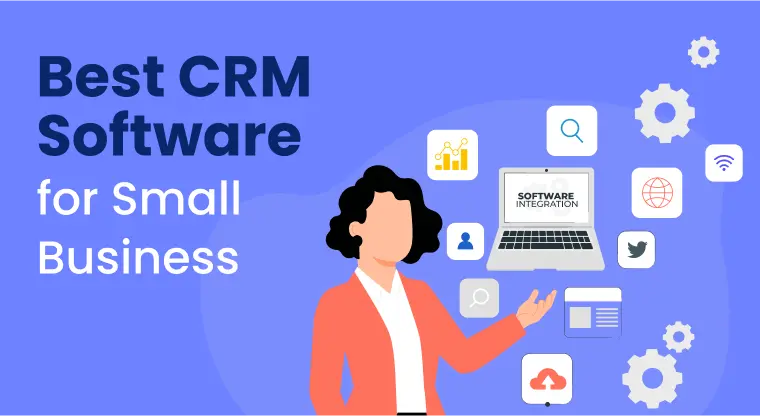
Zoho CRM: Affordable but is Packed with Feature
Zoho is mostly the top prior choice for small businesses as it’s budget friendly despite offering tons of tools. You can automate the follow-ups, manage leads and even get AI-powered sales insights. It’s like getting enterprise-level features without paying enterprise prices. If you are on a tight budget but still want a reliable system that grows with you, Zoho is the best option.
HubSpot CRM as it is Free and Easy to Start
HubSpot can be termed as the starter pack for many small businesses and is called so for good reason. The CRM is completely free to use, which makes it perfect if you’re just entering the world of customer management. The interface is clean and simple to learn, aslo you can upgrade your tools later on. if you are a freelancer or small shop, HubSpot is a safe tool to incorporate.
Salesforce the big player
To be said, Salesforce is the king of CRMs. it;s powerful, customizable and is trusted by many big companies. Many small businesses has started using Salesforce because of it’s flexibility. The only drawback that small businesses may experience is that it can be a bit complex it integrate on their own.
Freshsales: a simple, smart and automated CRM
It was designed with small business owners in mind. It’s super easy and clear to implement. It’s straightforward and clearly designed. It comes in with automated features like AI driven lead scoring and built-in email sequences. If you don’t want to waste your weeks on teaching the employes about complex systems, this is the perfect option.
QuickBooks CRM Integration: Perfect for Finance-Heavy Businesses
Integrating QuickBooks CRM will be a best option if you are already using QuickBooks for your accounting. It synces your customer and financial data so you don’y have to manually update invoices. This is particularly significant for service-based businesses which have to update invoices regularly.
Industry Specific CRM Solution
Not every business needs the same features. The best CRM for small businesses is the one that fits your day-to-day workflow easier. The integration of CRM for different industries can take place with following actions
Healthcare and Clinics
The factors that matter for CRM integration within Healthcare focused industries are HIPPA-friendly permissions, apointments and reminders. It is used to send automated appointment reminders, follow ups and to track referrals.
Real Estate and Property
The significant components include, pipeline stages, listing and deal tracking, and e-signaling. CRM integration will help matching buyers to listings, scheduling views, and log every calls in timeline.
Step by step CRM implementations
Either you are a small business or a large one, following steps are the basic ones for CRM integration
Assess the needs
The first step is to assess what your business demands are, from a CRM system. You can consult with stakeholders from different departments.
Choose the CRM
Now select the suitable CRM according to your business needs, either it be customisable or the standard one.
Strategize the implementation
Now develop a whole framework plan for the integration of CRM. start with setting the timeline, proposing the objectives and aims, setting up the metrics and allocating the resources.
Integration
Before implementing, you can customize the CRM if you have any specific detail required for your business.
Transfer the data
It is basically the process of migrating the data from one CRM system to another. Data may include your customer details, sales tracking, customer activities and other related facts and figures.
Test the CRM beforehand
Whenever incorporating a new system, it is super important to test it before going live. Testing can improve the efficiency and eradicate any possible troubleshoots.
Training the users
It’s is very important for you to integrate the CRM which must be user friendly and easy to learn. You must make sure to train your employees working with your system.
Make it live
Once you have trained your employees, it is now the time for going live. Making the system available for your customers.
Evaluation and feedback
Once used by the customers, ask them for the feedback. You can make improvements according to the feedbacks. Letting your customers evaluate your system is so important for your business progress and customer satisfaction.
The future of CRM for small businesses
There are many attributes that may contribute in making the CRM best for small businesses including AI as a real assistant. It may help drafting the emails based on callnotes, and suggest you best next actions. Predictive insights will help analysing the past history to make assumptions like, customers are likely to reorder this week.
Conversational and Mobile-first CRM helps logging call with a single tap, reply to the customers either on whatsapp or SMS. Privacy-first will have a clear role in auditing the logs, retaining data and tracking consents.
FAQs About CRM Small Businesses
What is the best CRM for small businesses?
The best CRM depends on your business size. If you are sunning a small business, it can either be Zoho or HubSpot.
How much does a CRM costs?
Ready-made CRMs: Free- $50/ user per month
Custom CRMs: From $20k for basic builds to $100+ for advanced systems.
How long does CRM development take?
Off-the-shelf: same day- 2 weeks
Custom CRM: 8-12 weeks for small builds and upto 6 months for complex one.
Why invest in a Custom CRM?
If your workflows are unique, compliance heavy or require deep integration, a custom CRM can save time and costs long term.
Which industries benefit more?
Healthcare, real estate, finance, e-commerce and manufacturing. The ones where data is sensitive, and workflows are complex.
Conclusion
A CRM for small businesses isn’t just a software but is a way to keep customers happy. It saves time and lets customer grow safer. For most small teams, starting with a ready-made CRM is enough. But if your business has more complex needs, go for the Custom CRM

